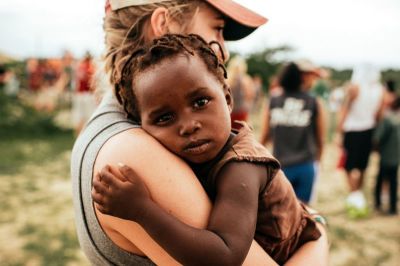Finding our place in the Body of Christ

Today, over 68 million people have been forcibly displaced from their homes worldwide, by violence, poverty or persecution. 800 million people are undernourished. 2.1 billion people lack access to safely managed drinking water services. Violence against women and girls is widespread, with the UN estimating that a third of women worldwide have experienced violence.
As Christians, we are troubled by these statistics; they invoke the compassion that is at the heart of our faith. But they are also overwhelming; we see so much pain in the news every day that we feel burdened by the weight of responsibility. We are compelled to be directly involved in the solution, putting our faith into action.
But sometimes in our zeal, we fail to discern the magnitude and complexity of Christ's Body, and we often overlook or underestimate the role of its other key members.
Who is responsible for responding to the needs of poor rural farmers in Haiti? The Haitian Church or the North American Church? Who is most implicated in bringing about peace and reconciliation in the Democratic Republic of Congo? The Church of England, Australia or the Congolese Church?
These are trick questions. Believers in Africa, the Americas, Eurasia, and Australia, are all part of one Body that is working intricately to bring God’s peace into the world. When a need arises 10,000 miles across the globe, we all, as one body, are responsible for responding to that need. However, it is essential that we understand that we do not all play the same role.
It is easy to point to the wealth, opportunity and privileges that the West enjoys and say, “We are called to be the solution.” But in doing so, we forget that all believers have been called into action. In Jesus's parable, the Master of the household distributed talents to all of His servants, and to this shrewd master even a fraction of a talent carried a weight of responsibility.
Likewise, all Christians, no matter where they live or what they possess, have valuable parts to play. When we treat materially poor Christians as if they have nothing to offer, we rob them of their reward, we rob "The Master" of His increase, and we rob ourselves of opportunities to benefit from their God-given gifts.
We also prevent the Body of Christ from attaining full maturity. The Apostle Paul told the Ephesians that, “when each part is working properly,” the Body grows so that it builds itself up in love.
In most regions afflicted by conflict, poverty, and hunger, the Church has at least some presence locally. These local churches are the ones that have the permanent assignment of being the light of God in these needy communities. Even the most committed Western missionaries have a temporary tenure when compared to the local church.
If we want to align our efforts, whether short term or long, with God’s mission in these various places, we need to learn to work with local churches more effectively. We need to learn to invest ourselves into building up their capacity to serve their communities for the long-haul.
World Relief often has opportunities to respond directly to poverty, displacement and other crises with handouts, a deluge of western volunteers and a manual of western solutions. Instead, we prefer to use our resources to empower local churches in the communities where suffering is greatest, because we have seen that these churches are incredibly more effective than we could be, with longer lasting results. We empower, inspire, and equip these churches to embrace the fullness of the calling that God has extended to every believer.
By helping local churches mobilize their members into their local ministry field, and mobilizing the resources that God has entrusted to them, we have found that we are able to reach more people much more effectively and more deeply than if we were to import the solutions along with imported problem-solvers.
When it comes to executing the mission of God in the earth, this is not a lesser call. This is not a lesser function. This is one expression of the Body of Christ working at its best. Believers that live closer to a problem are often better placed to bring tangible, long-term solutions. If suffering in the earth is an itch to be scratched, they are the right "fingers" for the task. However, these fingers are joined to the hand of their local congregation, which at times is extended by the arm of a mission organization, which rests upon the shoulders of the global church, which supports them with resources and prayer. This is one job for One Body with every member in its right place.
Wherever there is trouble, disaster or poverty, whether chronic or sudden, local churches are perfectly placed to be a critical part of the solution. The time has come for many of us to play a more supportive role in our ministries abroad and encourage local churches across the globe to step up and take their rightful place in service to their neighbors in need.




























